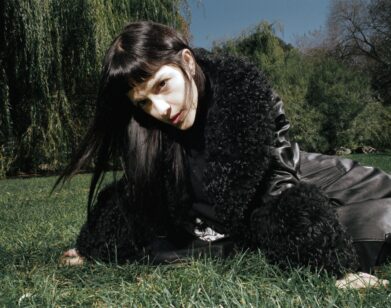From Sweden with Love

El Perro Del Mar, the nom de guerre of Swedish chanteuse Sarah Assbring, has returned with her third album Love Is Not Pop (The Control Group) (released in the US today), a burst of beautifully textured and refined pop songs exploring the melancholic side of love.
For it, her third release, EPDM steeps her sparse and simple songwriting in a new sonic brew with the help of Rasmus Hägg, one-half of the virtually ungoogleable Swedish electronic duo Studio, whose notoriously clever remixes and album of sun-drenched kitschy grooves “Yearbook 1” have blown a few minds in the last several years.
The emotional thrust of Love Is Not Pop comes from the natural feel of their partnership. Hägg’s production disguises the line between analog and synthetic instrumentation as if it were a metaphor for the difficulty of identifying when love is real, the album’s thematic core. For an album that explores the darker side of devotion, lust, infatuation, and tender weaknesses, it’s an inspired, though short, collaboration.
I caught up with Assbring over the phone from Stockholm where we talked about Bertolucci, why so many Swedes prefer singing in English, and her fears of opening up the creative process to the unknown.
ALEX SHERMAN: Can you tell me a little bit about how your collaboration with Rasmus worked out?
SARAH ASSBRING: Ever since I heard Studio for the first time, I had Rasmus in the back of my mind for some kind of collaboration. When I started drawing sketches for this album, I got in touch with him and we started talking about what we could do together. But it was just a discussion because we didn’t really know each other. Especially for me, I’ve always been a bit afraid of bringing someone too much into the process of making an album. He was the same way, also kind of a control freak.
So we talked a lot–a lot!–because we were afraid of what might happen. Finally, we just said, “Let’s just stop talking,” and after that everything was so simple. All of the things we spoke about and decided theoretically were put aside and we just worked together. It was very organic and the best recording situation I’ve ever had.
SHERMAN: What were some of those theoretical ideas you two talked about?
ASSBRING: I wanted to move into a more electronic/synthetic world, but I also wanted to keep it sounding organic. When he agreed to that I knew we spoke the same language. I wanted to record with real instruments, natural and analog, but I wanted to destroy the sounds so you could tell what kind of instruments are being played on the album, and that’s exactly what we did.
SHERMAN: Speaking of speaking the same language, as a Swedish artist who sings in English and has a large following in the states, I’ve always wondered what your songs would sound like in Swedish. Do you ever record them in your native tongue?
ASSBRING: I don’t. I’ve always written in English. The very simple reason for that is that pop music for me has always been in English. Maybe when I was 10 years old I wrote in Swedish. But I decided quickly that it just did not feel right. It is not how I express myself musically. Of course, I listen to Swedish lyrics. But when pop music really hits me it’s usually in English. When poetry hits me, it’s in Swedish. I don’t know why. I write a lot of poetry, and I would never, ever write poetry in English.
SHERMAN: A number of Swedish artists like Lykki Li and Peter, Bjorn and John sing in English, but there’s something shared among you that’s distinctively Swedish. Is it a sensibility that you share? Is there something that makes your music uniquely Swedish?
ASSBRING: When I’m asked that kind of question it’s so hard to speak to it from the inside. The answer is usually a very generalized response. But I think there definitely is something. Maybe it’s the simplicity and sparseness when it comes to lyrics. Translation helps me find a way of being very direct and simple and get to the point. At least that is what I’m attracted to or at least what I’m trying to do myself. When I think of singing in Swedish, I find it very hard to be direct.
SHERMAN: What is the meaning of “Love is not pop”?
ASSBRING: Before I started writing the album, a lot of things were happening to me personally and they all revolved around the theme of love, but it was all about the darker side of love. That became my theme. Then I was watching the Bernardo Bertolucci movie Last Tango In Paris and there’s a scene where the female character says those words, “Love is not pop,” to her future husband in an argument. At the time, she’s involved in this very seedy, destructive relationship with Marlon Brando’s character. It’s very fleshy and they’re not even sure if it’s love or not. It’s probably not love. But it’s very emotional and dirty in some way and it’s very alive. It’s that dirty kind of love. I knew at that point that would be the title because of the multiple meanings and contradictions within that sentence, as well as the contradictions I was going through my own life, my own ideas with love, and love having all these different faces.
SHERMAN: What is it about faces? You’ve said this album is a play on your persona. What do you mean by that?
ASSBRING: With my debut album, I was very much into writing simple pop songs but with some kind of complexity within it that would leave you not knowing what feeling you’re supposed to have, or what state of mind, or what kind of mood you should be in. It would appear as cheery. But if you listened to the lyrics there was something else there, something not typical to the kind of girl-groupy song. With the second album, I went somewhere else and tried to walk away from the simple structure, simple formula for a pop song. I always liked to put myself into different ideas of what I’m doing and who I am. That goes along with what people might think of me or what kind of music I should be making or what I’m about. I like to see if I can play with that or trick people.
SHERMAN: Did you set any specific rules for yourself with the writing of this album?
ASSBRING: Definitely. What’s extremely necessary for me is the feeling that when I write lyrics it feels totally, totally honest. I have to feel that I’m saying something that I really, really mean and I know exactly when I’m not being honest.
SHERMAN: Because there’s something inherently dishonest about pop music?
ASSBRING: Sometimes, definitely. At the same time, the original idea of pop music I think is to be as clear as you possibly can and to say what you really want to say and not embroider it words. That’s why I’m really into pop music. Then of course you can have pop songs that only say “I love you” and doo-wop and nothing else and ultimately say something very superficial, and I think that’s what I’m saying with Love Is Not Pop. The difficulties and the harshness and the hardness–they’re not the prettiest part of it, but they’re there.






